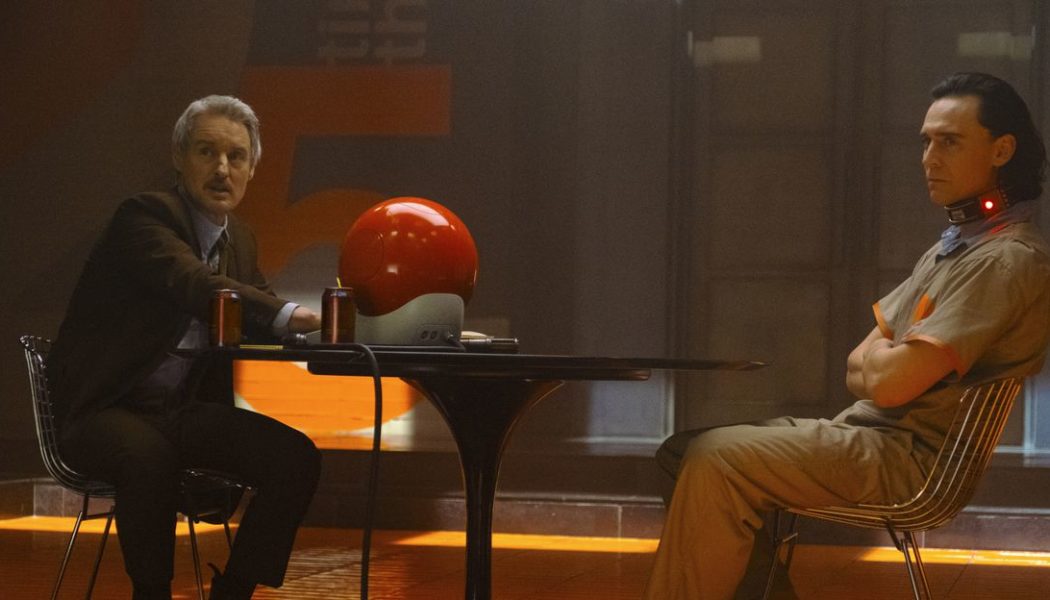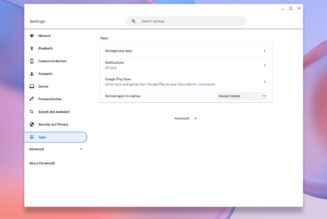When Loki is first captured by an organization devoted to maintaining the purity of the timestream, it’s a bit like a trip to the DMV.
His time at the TVA — otherwise known as the Time Variance Authority — includes taking a number to wait in line, walking through a metal detector-like security device, and verifying some paperwork. But there are some differences compared to getting your license renewed. Failing to queue up properly at the TVA can result in death. And that paperwork? It’s a massive stack consisting of literally everything Loki has ever said (including the two confused words he utters while standing in the office). It’s extremely funny to watch an all-powerful deity be forced through a confusing bureaucracy — and it’s the perfect way to start off the new Loki series on Disney Plus.
This review contains light spoilers for the first two episodes of Loki.
While Loki has been part of the MCU for a decade, his role has been somewhat scattershot: a handful of memorable appearances spread across six films. Loki, a six-episode series on Disney Plus, is his first chance at a starring role. The show follows the character, once again played by Tom Hiddleston, after he stole a magical doodad called a Tesseract in 2019’s Avengers: Endgame. Almost immediately, he’s captured by the TVA and accused of being a “variant” that has disrupted the timeline. He’s given a choice: be destroyed or partner with TVA agent Mobius (Owen Wilson) to help track down another fugitive variant who has been killing agents across various time periods. Naturally, Loki chooses the option where he doesn’t die.
:no_upscale()/cdn.vox-cdn.com/uploads/chorus_asset/file/22643549/ARC_101_03265_R.jpg)
Like other bureaucratic entities from movies like Men in Black or Hellboy, the TVA is the kind of organization that exists in the margins, unknown to almost everyone. Its objective is an important one: to maintain a timeline created by three beings known as the Time Keepers in order to prevent anomalies that will create new potentially dangerous timestreams. But they also operate like a straight-laced government department. There are rules and procedures to follow. Men and women sit behind desks oblivious to the outside world, as they appear to exist outside of time and space. (At one point, Loki threatens to gut an office worker like a fish; unfortunately, the desk jockey has no idea what a fish is.) Even magic doesn’t work within the confines of the TVA.
The result is a wonderfully absurd contrast between the mundane and the fantastical. Loki is completely out of place in this world, where his powers are useless and he has no idea what’s going on, making it impossible to truly plot ahead. At first, he’s his old arrogant self. When a judge asks whether he pleads innocent or guilty to being a variant, Loki says simply that gods don’t plead. But eventually, he comes to realize that he can’t fight the TVA, at least until he learns enough about them to come up with a scheme. There are some great slapstick moments, like when Loki is outfitted with a collar that lets a TVA guard send him back in time; every time Loki hops out of a chair for a sneak attack, he’s zapped back into his seat. Later, he fails to get a librarian’s attention until he rings a bell just right. These moments drive home just how out of place Loki is — and how in many ways he’s really just another cog in a big cosmic machine.
The relationship between Loki and Mobius is one of the most important parts of the show. It almost has a buddy comedy dynamic. The two clearly don’t trust each other, but they form a sort of uneasy alliance. At one point, when Loki tries to convince Mobius to follow one of his hunches, the TVA agent seems to think he’s being led into a trap. To assuage his fears, Loki tells him: “Trust one thing — I love to be right.” The chemistry between Wilson and Hiddleston is great, with the pair able to seamlessly transition from throwing barbs to contemplating serious revelations. Mobius has spent a long time studying Loki, and he’s both unfazed and impressed by him. Early on, he shows Loki pivotal scenes from his life, asking questions like “Do you like to hurt people?” Eventually, Loki breaks down and starts to worry that he’s a villain. “That’s not how I see it,” Mobius tells him. It’s a touching moment that further complicates an already complicated character, as you can never really tell what side Loki’s on (aside from his own).
:no_upscale()/cdn.vox-cdn.com/uploads/chorus_asset/file/22643550/ROX1400_102_comp_v005.1091.jpg)
Loki also has a vibe that — at least early on — feels unlike anything else in the MCU. The TVA has a retro-futuristic quality, with computers and interior designs that look ripped from the 1970s. The agency even has a cute little watch mascot, which also appears to be sentient, sort of like a holographic Siri mashed with the Kool-Aid Man. It’s both surreal and grounded, like something Douglas Adams would dream up. And as opposed to the more typical action-oriented Marvel stories, Loki plays out a bit like a police procedural, as Loki and Mobius attempt to figure out just who the fugitive variant is. Without his superpowers, Loki is forced to spend hours at a desk, flipping through files in hopes of finding a clue, before venturing out into the field to investigate. He quickly goes from god to amateur detective. The time travel premise also means that the show is able to jump around a lot, with visits to everywhere from Pompeii to a futuristic big box store.
Much like WandaVision, Loki is evidence that there’s a lot of room to experiment within the tight confines of the MCU. It blends elements of buddy comedies and police procedurals with a hefty dose of classic sci-fi, helped along by an incredibly charming cast. It’s also a story that seems ideally suited for episodic storytelling, with the space to dig deeper into a character that’s often stuck on the periphery of larger moments. In its first two episodes, Loki nails the formula — now we just have to see if that momentum keeps up for the next few weeks.










